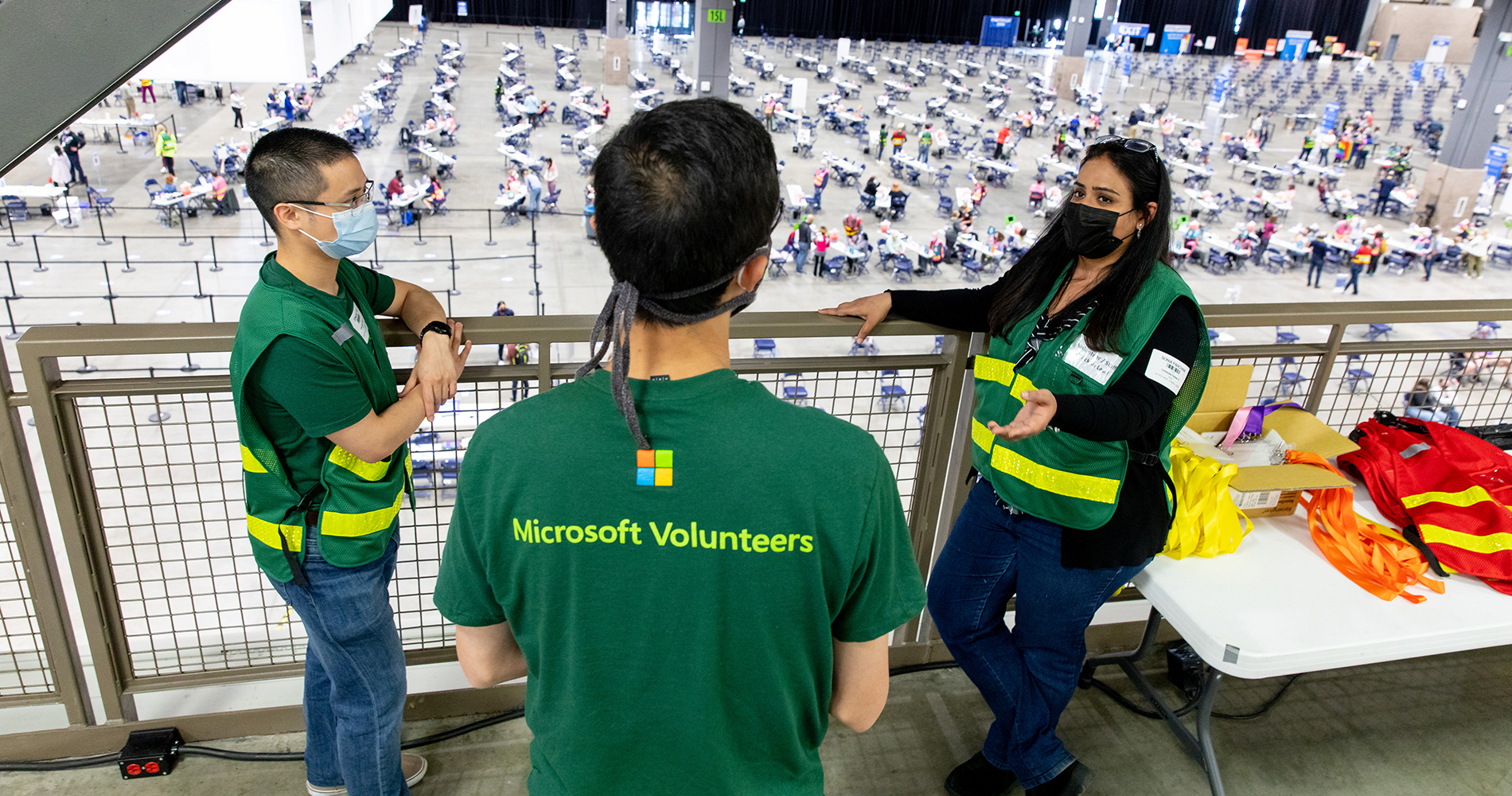
‘Magical’ moments at Seattle’s mass-vaccination site inspired volunteers to help end the pandemic
When Kevin Otten came out as a member of the LGBTQ+ community in high school in the 1990s, a youth group he joined in his small town helped him find a sense of belonging and provided the support he needed to navigate a new and difficult situation.
The volunteer teachers, counselors and businesspeople who ran that group made such a profound impact on his life that for the past two decades he has tried to emulate them by volunteering himself.
So, it was a given that Otten would become one of more than 1,300 Microsoft employees who volunteered to help the city of Seattle run the largest civilian-led mass-vaccination site in the U.S. over the past three months. About 1.5 million residents from King County, where the company is headquartered, have been vaccinated against COVID-19. That made Seattle the most vaccinated major city in the country and prompted civic leaders to close the site earlier than planned, with the last shots given out June 12. Now, Microsoft is matching the hours its volunteers worked with a donation of more than $235,000 that will support community organizations around Washington state working to provide more equitable vaccine distribution.
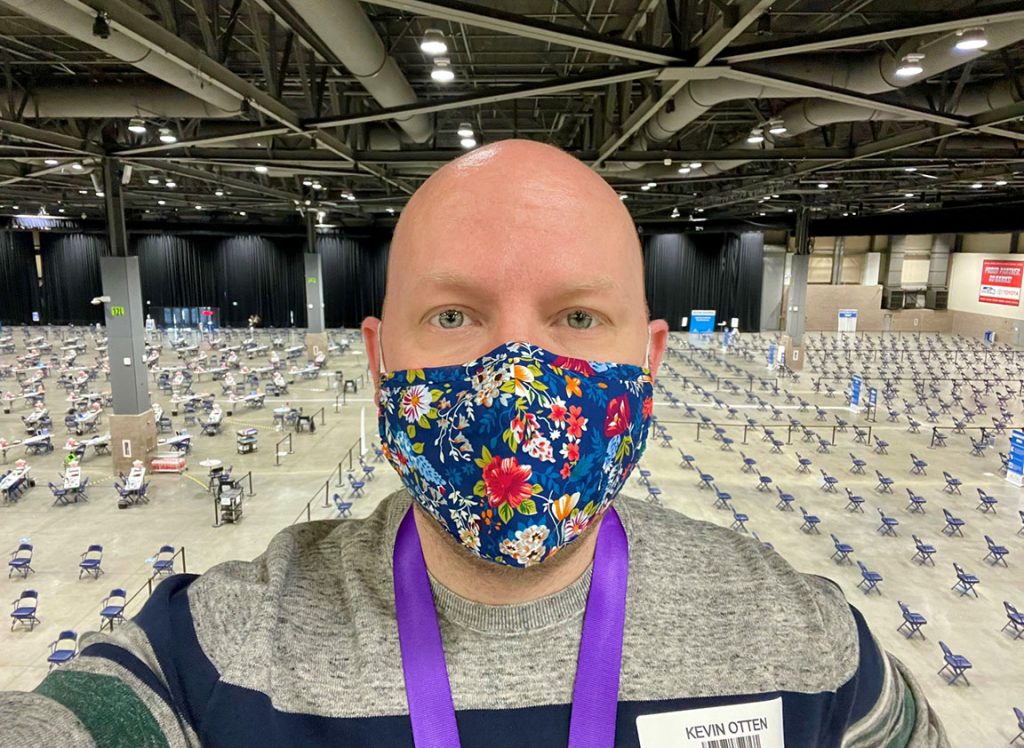
Kevin Otten at the Lumen Field mass vaccination site in Seattle (Photo provided by Otten)
“The only way we’re going to make it out of this pandemic is together, helping each other out,” says Otten, who works in human resources for Microsoft’s Cloud and AI business. “Every person on the planet has been impacted by this pandemic in a profound way, and for the past year we’ve been isolated from each other in a way that’s unparalleled. Volunteering at Lumen Field was the first opportunity we had to feel that sense of community and connection with our neighbor again, and it’s been a life-changing experience.”
To free up the city to focus on the clinical side of the effort, Microsoft managed all volunteer and staff check-in needs at the site, a 325,000-square-foot event center at Lumen Field, the arena where the Seahawks play football and the Sounders play soccer just south of downtown Seattle. But so many employees signed up to help before the March 13 opening that they quickly expanded to helping in all other non-medical roles.
Otten himself helped with data entry, inputting patients’ information as they were getting their jabs; with health check-ins before people entered the building; with directing patients to the right lines; and with walk-in registrations.
“A lot of people wanted to take selfies to commemorate the moment,” Otten says. “Sharing that experience with them was truly magical.”
Whether volunteers were down on the convention center’s floor with patients as they received the vaccine or were watching the massive operation unfold each day from the staff and volunteer check-in area up above, “you’d get goose bumps,” says Mike Brewer, a director on Microsoft’s Employee Giving Team. The convention center’s size allowed thousands of patients to file in and get vaccinated at distanced tables each day, with enough fresh air to keep them and the hundreds of medical staff and volunteers as safe as possible from the virus.
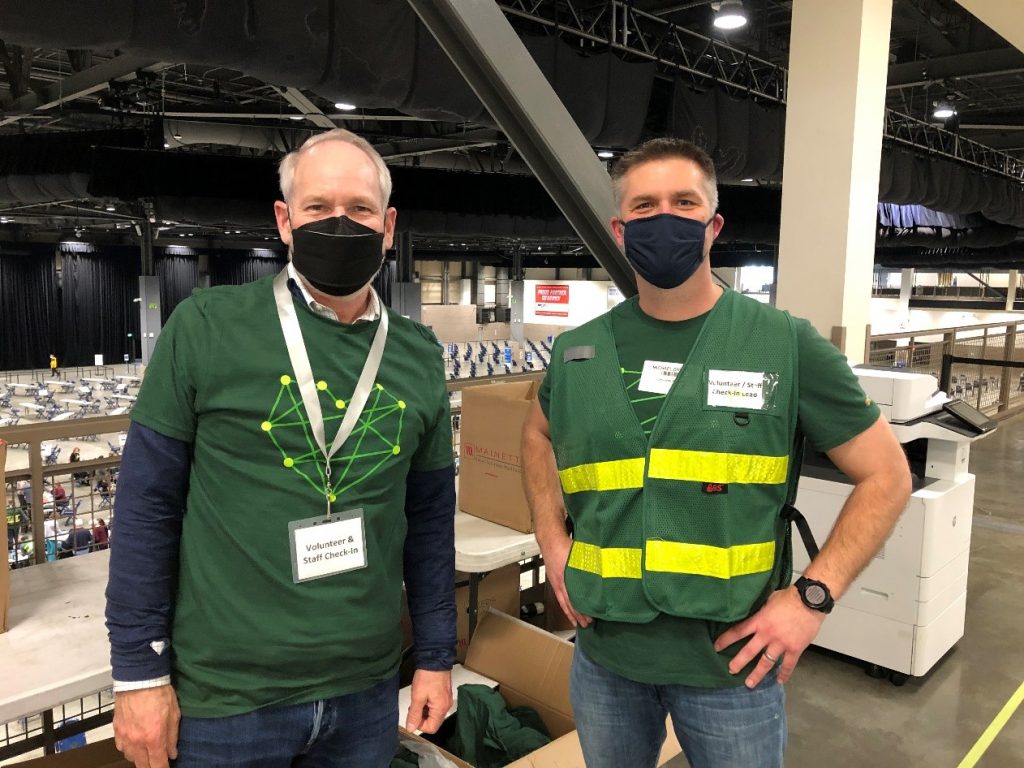
Kurt DelBene (left), an executive vice president at Microsoft who leads the company’s COVID-19 response efforts, and Mike Brewer (right), a director of the company’s Employee Giving Team, at the Lumen Field mass vaccination site in Seattle (Photo provided by Brewer)
“People were very hungry to do something to help and to connect with others,” Brewer says. “Folks told me that it was an amazing release for them to give back to society in a way, and to be part of this historic opportunity to help the community get back to normal as quickly as possible. There was no ego in that place. You could ask Microsoft people to do any task and they’d say, ‘Yep, I’m here to help.’”
For Sonia Parchani, an engineering manager in the Azure data group, the highlight was hearing the thundering round of applause when vaccinations would begin at 11 a.m.
“People were so excited that we finally have a solution, that we’ll have an end to the pandemic with this vaccination effort,” Parchani says. “It was just amazing being there.”
After Parchani’s father-in-law passed away in December in India, her husband flew there for the funeral and brought his mother back to live with their family and Parchani’s parents in a Seattle suburb. The extra help with their two children gave her and her husband the freedom to each take a shift at Lumen Field every week — she on Wednesdays and he on Saturdays.
“We explained to our kids how important it is to do something beyond just your own family, and then they saw us actually demonstrating it, and that was important for them to see and learn as well,” Parchani says. “I hope to do more of this.”
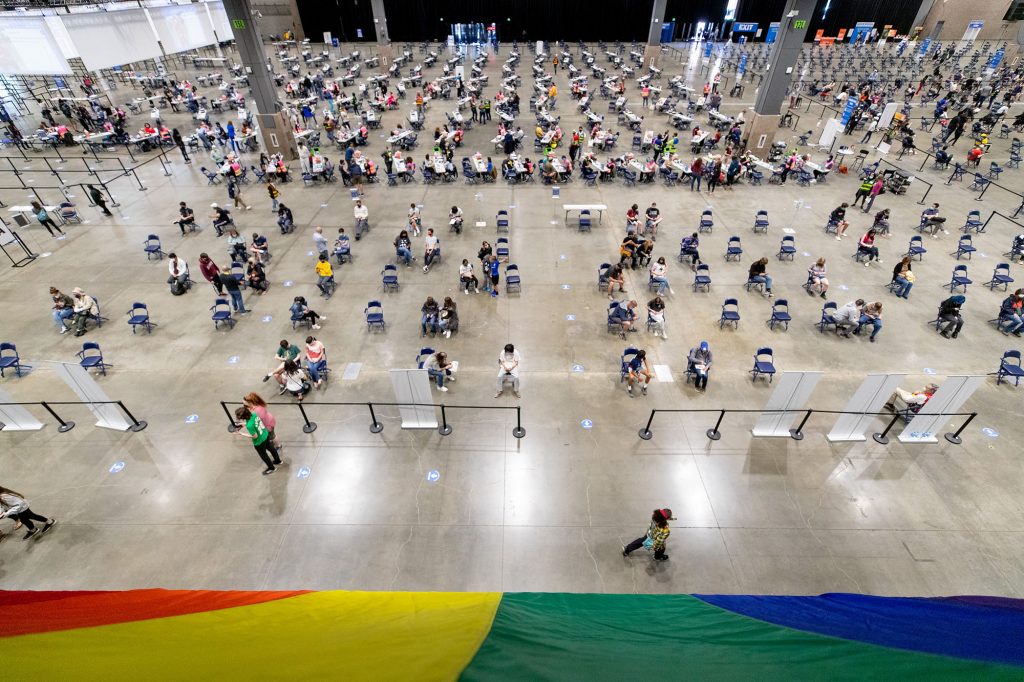
More than 1,300 Microsoft employees volunteered for more than 9,400 hours between March and June at the Lumen Field mass vaccination site in Seattle, triggering a matching donation by the company of more than $235,000. (Photo by Scott Eklund/Red Box Pictures)
Microsoft’s employee giving program, which began in 1983, provides a $25-an-hour match to eligible organizations where employees volunteer and a dollar-to-dollar match on monetary donations. There are also various company-sponsored activities throughout the year, including a month-long giving campaign each October where employees organize hundreds of fundraisers and events supporting causes they care about. Giving is a top-down priority supported by every level of leadership, Brewer says.
Last year, despite the pandemic, employees donated $225 million and volunteered more than 750,000 hours. So, Brewer says he wasn’t surprised when he had an immediate waiting list in March, with 1,300 signed up for 150 volunteering slots before the clinic had even opened.
“It’s a big part of our culture for employees to express things they’re passionate about,” Brewer says. “Lumen Field represented a rebound opportunity for people to rally around giving again.”
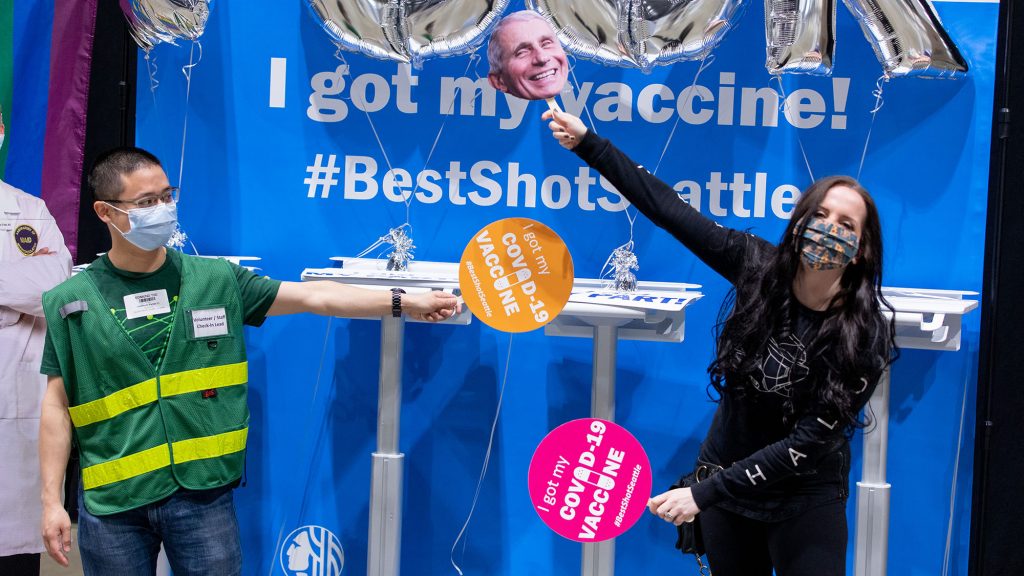
Microsoft employees and volunteers Edmund Tse (left) and Jenn Panattoni (right) at the Lumen Field mass vaccination site in Seattle (Photo by Scott Eklund/Red Box Pictures)
Edmund Tse has visited his parents and brother in Australia almost every year in the decade he has worked for Microsoft in the U.S. as a software engineer, but the island nation shut its borders when the pandemic hit, and he hasn’t seen them since 2019.
When his volunteer work with the ski patrol was paused last winter at Snoqualmie Pass, in the Cascade Mountains just east of Seattle, Tse says he looked for “something else that would make sure I’m contributing to help stopping this pandemic as soon as possible.”
Tse became a lead at Lumen Field, directing colleagues as they verified IDs of arriving volunteers and staff and issued badges on color-coded lanyards.
For Tse and most other volunteers, their shifts at Lumen Field were the first time in a year they’d been indoors with other people. And that was part of the appeal.
“It was strange but rewarding to talk to each other in person and to be in the same space as other people after a year of social distancing,” Tse says. “I’m an introvert, but this provided a way to maintain contact with humanity.”
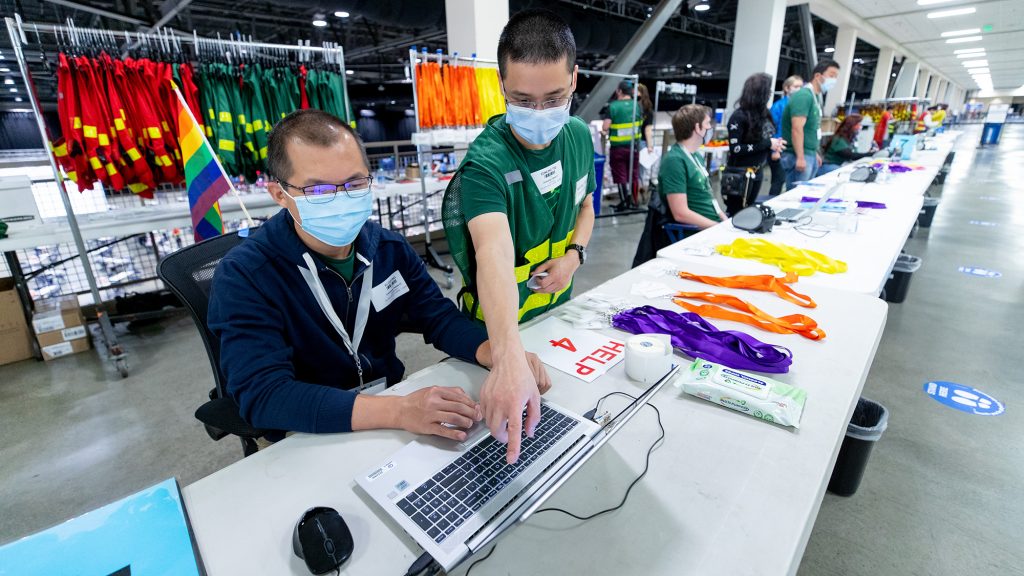
Edmund Tse (right) says volunteering at the Lumen Field mass vaccination site “provided a way to maintain contact with humanity.” (Photo by Scott Eklund/Red Box Pictures)
With Microsoft’s large presence at the site, it also offered a way for colleagues to see each other again. Jenn Panattoni took on a new role in July as the head of social good at Xbox, but she first met her new boss in-person as they volunteered together at Lumen Field this spring.
Panattoni’s grandmother, whom she says was “one of the most important people in my life,” died of COVID-19 last September. A nurse held up a smartphone at her grandmother’s hospital bed for 45 minutes so everyone in the large Italian family could say goodbye to their “nonna.” Devastated that she couldn’t be there in person, Panattoni vowed to do what she could to help the vaccine get established and restore family connections.
“Anything I can do to help lots of people get vaccinated and keep themselves safe and keep others safe is important work,” says Panattoni. “I feel good that I did something to help my community, and I was part of this amazing sea of people who came together to help save lives.”
The only way we’re going to make it out of this pandemic is together, helping each other out.
Employees logged more than 9,400 hours at Lumen Field — more than three times as many as for the Special Olympics USA Games held in Seattle in 2018, when Microsoft employees also showed up in force to support the community. The company is matching the Lumen Field hours with a $25-per-hour donation to the All in WA vaccine equity initiative, adding up to more than $235,000 that will support pop-up clinics around Washington state to help vaccine distribution be as equitable as possible.
And although it was emotional to see the massive effort wrap up last week, Brewer says he has a growing list of those smaller clinics that will need volunteers to help them go the last mile.
“The job’s not done yet,” he says.
Lead image: Edmund Tse (left) and Sonia Parchani (right) prepare for a shift at the Lumen Field mass vaccination site in Seattle. (Photo by Scott Eklund/Red Box Pictures)
